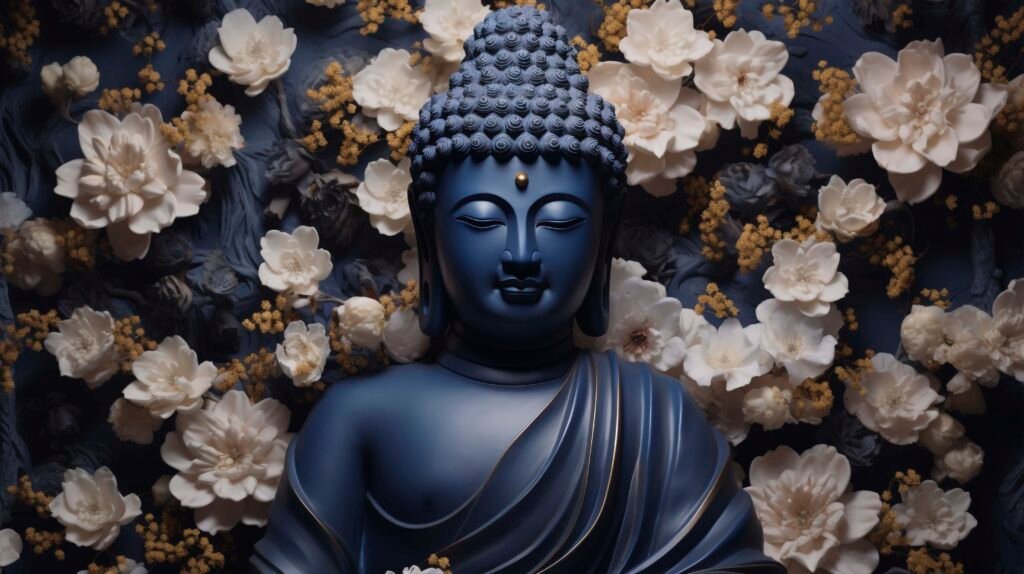Table of Contents
ToggleDharma” isn’t just a spiritual term; it’s a way of life that aligns your actions with purpose, integrity, and harmony. Found in many Eastern traditions, including Buddhism and Hinduism, dharma teaches us how to live the “right way.”
It’s not just for monks or saints; dharma applies to your everyday choices, actions, and goals. Whether you’re a student, parent, or professional, understanding your dharma can bring more peace, clarity, and direction to your life.
In Buddhism, dharma means following the Buddha’s teachings for inner peace and compassion. In daily life, living your dharma means making decisions that align with your values and purpose. Learning about dharma in Buddhism can help you create a more mindful, stress-free, and meaningful lifestyle.
The Origin Of Dharma
Where the Idea Comes From
The word “Dharma” originates from the ancient Sanskrit root “dhr-,” which means “to hold,” “to maintain,” or “to support.” It describes what keeps the world in balance, like an invisible force that helps everything stay in its proper place.
Dharma in Different Traditions
Hinduism
In Hinduism, Dharma is often described as your personal duty based on your stage in life, your role, and your values. The Bhagavad Gita teaches that it’s better to follow your own path, even if you make mistakes, than to live someone else’s path perfectly.
Buddhism
For Buddhists, Dharma refers to the teachings of the Buddha and the natural law that reveals how reality works. It’s not about belief but about cultivating understanding, compassion, and mindfulness through the Eightfold Path.
Jainism
In Jainism, Dharma goes beyond duty it also means right conduct and moral virtues like non-violence, truth, self-control, and forgiveness. It’s a path toward spiritual liberation through ethical living.
Sikhism
Sikh dharma emphasizes living truthfully and serving others. Actions like seva (selfless service) and community kitchens embody this duty, promoting equality and compassion for all.
Why Dharma Still Matters Today
Across all these traditions, Dharma serves as a universal guide, not a strict rule, but an inner compass. It balances personal values, responsibilities, and spiritual goals.
Today, the concept of living your dharma helps people make ethical choices, discover deeper meaning, and act with compassion in a fast-changing world. Whether you’re exploring Dharma in Buddhism, finding your work dharma, or wanting to just understand your purpose, it’s about aligning your life with what feels deeply right.
Types of Dharma in Daily Life
1. Personal Dharma – Walking Your Own Path
Personal dharma means walking a path that matches who you truly are at your core. It involves knowing your values, talents, and purpose, then shaping your actions to match them. In Buddhism and other traditions, this form of dharma is seen as a journey of self-discovery, understanding who you are and why you are here. By following your inner compass, you move closer to a life of peace, authenticity, and fulfillment.
2. Social Dharma – Your Duty Towards Others
Social dharma focuses on how you interact with the people and community around you. It reflects the principles of kindness, fairness, and respect that appear across Buddhist dharma teachings, Hindu dharma, and Sikh ethics. Living your dharma in this sense means contributing to harmony, helping those in need, and upholding truth even when it’s difficult. Social dharma is the thread that keeps relationships and communities strong.
3. Work Dharma – Purpose in Your Profession
Work dharma is about bringing meaning and responsibility into your profession, no matter the role you hold. In Buddhism, dharma means the truth about life and the teachings that help you live in balance with it. When you perform your duties with honesty, dedication, and a sense of service, you are living your dharma at work. This approach turns everyday tasks into acts of purpose and helps create a balance between personal growth and contribution to society.
How to Know Your Dharma
Finding your dharma is like uncovering your life’s true direction, the path that feels natural, purposeful, and fulfilling. In Buddhism, dharma means the true nature of life and the lessons that guide you to live in harmony with it. For modern readers, it’s about aligning your daily choices with your inner values.
Here’s how you can discover it:
1. Listen to Your Inner Voice
In the noise of daily life, your dharma often whispers quietly. Set aside moments for meditation, mindful breathing, or simple reflection. Ask yourself: Does this decision reflect my true self and values? In Buddhist dharma practice, this self-awareness is the first step to living mindfully and in harmony with your purpose.
2. Follow Your Strengths and Passions
Your natural abilities and interests are strong indicators of your personal dharma. Reflect on the moments when you’re so absorbed in what you’re doing that hours pass without you noticing. Are you a problem solver, a healer, a creator, or a guide? In both Hindu and Buddhist dharma, these strengths are seen as signs of your role in the greater good.
3. Notice What Brings You Peace and Joy
True dharma brings a sense of calm, even when life is challenging. If helping others, creating something meaningful, or learning new wisdom fills you with peace, that’s your dharma speaking. In living your dharma, the goal isn’t just personal success, it’s finding balance between your happiness and your contribution to the world.
4. Pay Attention to Life’s Repeated Lessons
Sometimes life keeps pushing you toward certain experiences or challenges. These patterns often point toward your dharma. In Buddhism, this is part of karma and the cycle of learning, guiding you to your role in the greater flow of life.
Living Your Dharma Every Day
- Simple Acts with Big Meaning
Living your dharma doesn’t always mean making huge life changes. Dharma in daily life can be as simple as showing respect to elders, offering help to a colleague, or speaking with kindness. Even small acts, when done with awareness and compassion, align you with your personal dharma. In Buddhism, these mindful actions create positive karma and a more peaceful mind.
- Choosing What’s Right Over What’s Easy
True dharma often requires courage. Living your dharma means following your moral compass, even when the easy choice is tempting. This could mean telling the truth when a lie would save you trouble, or defending someone who is being treated unfairly. In Buddhism, dharma encourages making choices that benefit both yourself and others, keeping harmony in relationships and society.
- Staying True to Yourself
Your dharma is your own special path, shaped by what you believe in, the choices you make, and the purpose you follow. It’s a journey only you can walk. What’s right for you might be wrong for another, and that’s okay. Living your dharma means tuning into your true self and honoring your core values, even when the world pushes you in a different direction. In Buddhist dharma practice, this self-honesty is seen as a foundation for inner peace and spiritual growth.
- Making Dharma a Daily Habit
Living your dharma becomes easier when it’s part of your routine. Start your day with a few minutes of mindfulness or gratitude. Make conscious choices about your words and actions. Over time, these habits strengthen your connection to your true purpose and help you live in harmony with the world around you.
Why Dharma Can Transform Your Life
Living in harmony with your dharma, your true purpose and ethical path can bring profound benefits:
1. Inner Peace & Reduced Stress
Acting in alignment with your dharma fosters inner peace, a state of calm even amid chaos, as defined by spiritual psychology. Mindfulness and purpose rooted in dharma lead to mental balance and less internal conflict.
2. Clearer Choices & Authentic Relationships
Following your dharma helps you make decisions that reflect your values instead of external pressures. When you live your dharma, you feel more confident, and as the saying goes, “You never lose anything by staying true to your own path.” The right people and opportunities will naturally come your way.
3. Compassion & Richer Connections
Dharma emphasizes virtues like compassion, empathy, and right action, qualities that deepen human connection and trust. When we live with moral clarity, our interactions naturally become more meaningful and grounded.
4. Long-Term Fulfillment & Self-Integrity
Committing to dharma isn’t always easy; it requires courage and consistency, especially when the convenient path is tempting. However, staying true to your principles cultivates respect, self-worth, and long-lasting emotional well-being.
Conclusion
Your dharma is your inner compass, guiding you toward peace, clarity, and a more meaningful life. Start with small steps, whether it’s practicing kindness, making mindful choices, or following your passion, and let these actions shape your path.
If you want to explore more about mindfulness, spirituality, and living your dharma, visit Hidden Mantra for more inspiring blogs and guides to support your journey.







